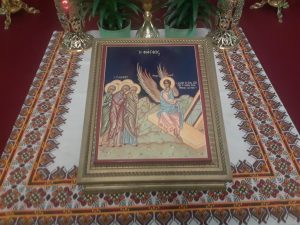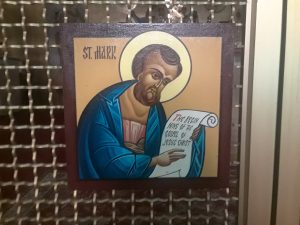on Mark 15:43-16:8
In our church, just before Great and Holy Friday begins with Strasti (Matins with the 12 gospels of the Passion of Jesus Christ), we set up the tomb. Behind it, we set up the cross. Then, at Burial Vespers, like Joseph of Arimathea, we fill the tomb with the icon of Christ’s corpse on his burial shroud. At this tomb, we keep vigil and pray Jerusalem Matins, which is the triumphant funeral of Christ, as he is in Hades and is there defeating death and hell. As Great and Holy Saturday comes to an end and the glorious Pascha begins, we empty the tomb of the burial shroud and carry it into the holy place, for Christ is risen! And his body no longer occupies the grave. Now, the tomb is empty. Today, we stand next to the empty tomb with the myrrh-bearing women.

Russia, Vologda, early 16th century
Tempera on wood, 75.5 x 61 cm
Note that the myrrh bearing women go very early before the dawn while it is still dark to the tomb. Our Triodion ends by telling us to begin the celebration of Resurrection Matins and Divine Liturgy for Pascha at midnight. According to the Gospel of Mark, the approach to the tomb was much later on as the sun was about to rise. But it was still in the dark as day was about to break. We begin in the dark, and that is deeply significant, for out of the black darkness of Hades, Christ rises like the rising of the sun. His name is the rising of the sun.
As the sun is rising, the myrrh-bearing women come to the tomb and find the stone already rolled back and, entering, they find a young man in a white robe. Mark calls him a “young man,” not an angel, and I imagine that this is what he at first seemed to be. He proclaims the resurrection of Jesus and shows them the empty tomb.
The first response of the to this empty tomb and to the gospel of the young man they meet there, is… silence. That is, they tell no one, for they are afraid. In the most ancient manuscripts, this is in fact the last verse of the Gospel of Mark. They said nothing to anyone, for they were afraid.
Let’s think about the trembling fear of the women in this moment. Is this the fear of cowardice or is this something else? It may be tempting, upon hearing that the women told nothing to anyone because they were afraid, to suspect them of cowardice.
But remember, these were not cowardly women. These were the only disciples who stayed with Jesus until the end, according to Mark. It was the other disciples who ran away – not these women. These are the women who watched from afar while Jesus was tortured and killed. They did not avert their eyes. Their love for him compelled them to be present to him even in his agony and now even in his tomb they come to care for him. Knowing this about them, perhaps we should hesitate now to interpret their fear as cowardice. There is a kind of fear other than cowardice. There is also the fear of the Lord.
These women are experiencing the first glimpses of the mystery of the Resurrection. And it is being shown to them as emptiness. As nothing. Here look, says the young man, he is not here. Here is nothing.
The women surely perceive this emptiness rightly – as full of significance. But as the power of the mystery it signifies is dawning in their hearts as the sun is dawning in the East, they find that no words can come to their lips. No words form on their lips equal to the mystery.
The Lord has told his disciples at another time, “Do not worry about what you will say. God will give you the words.” Here, these women (who may well be filled with fear of God and awe at his holy mystery) obey the word of the word of God to wait for the words he will give them. Their fear is not the fear of worry about what they will say. I think their fear is of God. I think it is a holy fear.
Note an interesting contrast: Throughout the gospels, Jesus commands people to be silent about the great works he has accomplished for them. But they cannot keep silent and they go and tell everybody. Now, these women are commanded go and speak, and they cannot speak but keep silent.
These women were devoted and obedient to the Lord, who had so often commanded silence. Are they going to obey an unknown young man or are they going to obey the Lord? Remember, according to Mark, they see him at first as a young man, and not yet as an angel. I imagine that they realize he was an angel only after the fact, in the light of the resurrection. So, are they going to obey this young man? These women are devoted to the Lord. It is him they will obey.
And anyway, didn’t the young man also prophesy that the Lord was going ahead of them to Galilee? The most ancient manuscripts of Mark do not include any description of what these later appearances of the Lord were to be like – only this reference that in fact the Lord was going to appear to his disciples later. And that’s where it ends. Later manuscripts of Mark include the appearance of the Risen Lord first to Mary Magdalene and then to his other disciples. In fact, we read this passage from Mark at Matins this morning. And all of the other gospels describe the encounters of various disciples with the Risen Lord, and the effect of that encounter is always radically different than what we see here at the shorter end of Mark. I think that’s because here at the end the Mark, there is not yet any encounter with the Risen Lord, there is only the empty tomb.
A message here for us is that those who have not actually encountered the Risen Lord, could not dare to shout, Christ is risen!
How then, can we shout it? We have been shouting it now for two weeks! How do we dare? Because we have encountered the risen Lord Jesus Christ by grace. We are baptized into his resurrection. And, like the disciples on the road to Emmaus, in the breaking of the bread, we see him!
And so now we shout, while standing next to the empty tomb, Christ is risen!


